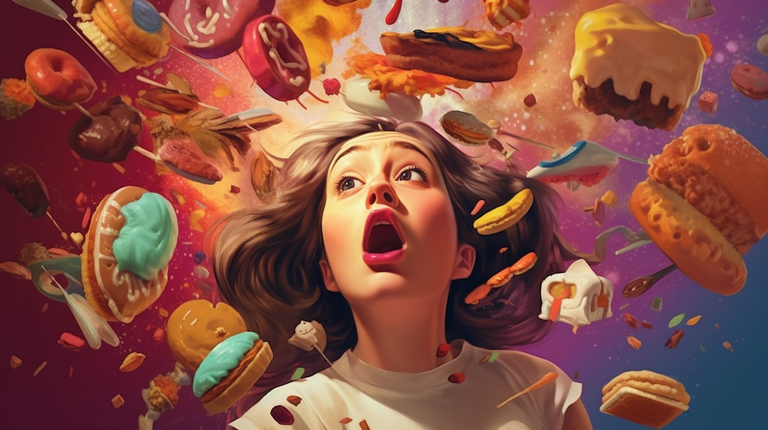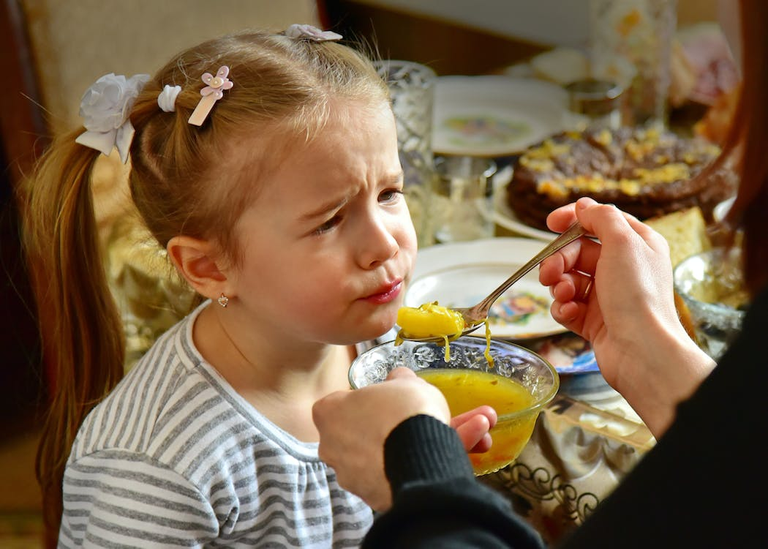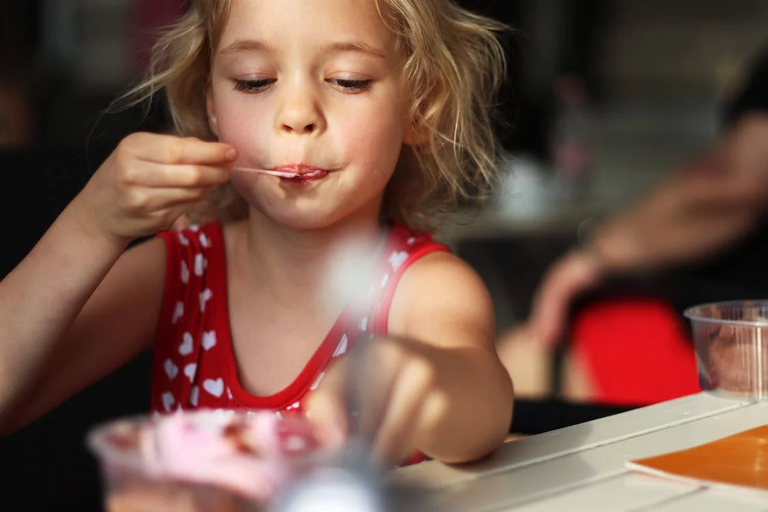
Sweet childhood

One of the things that could not be missing in the house was food. My parents bought food necessary for our growth: milk, meat, vegetables, fruits. Like most children, we had our favorite foods, but also those we didn't like. The one that all the children in the house agreed to loathe was soup. Like the cartoon Mafalda, we cried every time we saw the cup full of broth and vegetables on the table:
I don't want soup, I would cry, trying to get my tears to convince the adults to give me something else. Never, as far as I can remember, did my tears work and they took away the cup of broth, but I do remember that many times our parents used as a condition that we had to have the soup in exchange for something else:
If you eat the soup, you'll be able to go outside. If you eat the soup, you'll be able to watch TV. If you eat all the food, you'll be able to eat candy. -Our parents bargained in "you give me what I want, I'll give you what you ask for" transactions.

If you eat all the food and take a nap, I'll make you Chocuta," my grandmother offered, knowing that this was her winning card.
Maíta, but I don't like onions or garlic," I would explain in a fussy way, pulling the stews out of the soup as if they were castaways.
Then I don't make chocuta. You decide: either you eat all the food or I don't make chocuta," my grandmother threatened without the slightest consideration for my tears.
Eat your soup, Nancy," my sisters begged me with their empty cups in front of them, "Close your eyes and swallow! -they reminded me of the infallible trick. At that moment I closed my eyes with one hand and with the other I frantically brought the spoon to my mouth. I swallowed the marinated broth without chewing, in an accelerated manner, without giving myself time to taste anything with my tongue.
Ready! -I shouted with my hands up in triumph as if it were a competition.
Then grandma would get up from the table and go to the kitchen to fulfill her promise: to make the famous chocuta. Immediately the smells of caramelized sugar, anise, cloves and cinnamon would mingle and envelop the house, making us, like Pavlov's puppies, begin to salivate imagining the delicacy that was being made.

It was the time for joy, stories and laughter. My grandmother would sit next to us and start telling us stories, singing songs while the flavors of the spices and syrup, the lumpy and warm texture of the dough exploded on our palate. Somewhere it must be written that everything that is taught while tasting something sweet is learned, because I still remember those stories and those songs that grandma used to tell us.
Years later, when my grandmother had already died, my sisters and I wanted our mother to make us chocuta. But what she made us was a paste of bread and sweet water. We all told her that that was not chocuta, that it was just bread with caramelized water. My mother confessed to us:
Chocuta is just that: hard bread with sugar water, cinnamon and cloves. At that time we were so poor that your grandmother invented that sweet so that you could have a daily snack.
That confession shocked me a lot because I would never have imagined that we were poor and that the delicious thing that made us lick our lips with pleasure was simply hard bread with sugar water. After that I have believed that sweet things, perhaps, are what most remind us of our childhood and that there are people who work magic to make us happy.

This text is my own, translated with Deepl and the images are free of charge.


Thank you for your reading and comments, friends. Until next time
![Click here to read in spanish]
Una dulce infancia
En casa, jamás supimos que éramos pobres o por lo menos, jamás tuvimos la idea de que nos faltase algo, que el dinero faltara o que nos priváramos de algo por falta de dinero. Mis padres eran dos trabajadores de la universidad y en la medida de sus posibilidades, nos daban todo lo que quisiéramos y si no, la tristeza por no tener algunas cosas se iba con la facilidad de la corriente del agua que se lleva el río.
Una de las cosas que no podía faltar en la casa era la comida. Mis padres compraban alimentos necesarios para nuestro crecimiento: leche, carne, verduras, frutas. Como la mayoría de los niños, teníamos nuestras comidas preferidas, pero también las que no nos gustaban. En la que coincidíamos aborrecer todos los niños de la casa era la sopa. Como la caricatura Mafalda, llorábamos cada vez que veíamos la taza llena de caldo y verduras en la mesa:
_Yo no quiero sopa –decía yo llorando, intentando que mis lágrimas convencieran a los adultos a darme otra cosa. Nunca, que yo recuerde, mis lágrimas funcionaron y me quitaron la taza de caldo, pero sí recuerdo que muchas veces nuestros padres utilizaban como condición que nos tomáramos la sopa a cambio de otra cosa:
_Si te tomas la sopa, vas a poder salir a la calle. Si te comes la sopa, podrás ver la tele. Si te comes toda la comida, podrás comerte un dulce. –negociaban nuestros padres en transacciones de “tú me das lo que yo quiero, yo te doy lo que me pides”.
Comer dulces, caseros o industriales, era el mejor premio por hacer la siesta. Al despertar de la siesta que duraba una hora, más o menos, mi abuela era la encargada de repartir la dulcería que guardaba en la alacena. En partes iguales y con la cantidad pertinente, mi abuela picaba los pasteles, llenaba las tazas de mermeladas de futas y helado, ante nuestra mirada expectante e impaciente. Pero si había un manjar que nos gustaba mucho y nos alegraba el alma, era la Chocuta.
_Si se comen toda la comida y hacen la siesta, les hago Chocuta –ofrecía mi abuela sabiendo que aquella era su carta ganadora.
_Maíta, pero a mí no me gusta la cebolla, ni el ajo –explicaba yo de manera melindrosa, sacando los guisos de la sopa como si fueran unos náufragos.
_Entonces no hago chocuta. Tú decides: o te comes toda la comida o yo no hago chocuta –amenazaba mi abuela sin la menor consideración a mis lágrimas.
_Cómete la sopa, Nancy –me suplicaban mis hermanas ya con sus tazas vacías frente a ellas- ¡Cierra los ojos y traga! –me recordaban el truco infalible. En eso yo cerraba mis ojos con una mano y con la otra llevaba la cuchara a la boca de manera frenética. Tragaba el caldo adobado sin masticar, de manera acelerada, sin darme tiempo a saborear nada con la lengua.
_¡Listo! –gritaba yo con las manos hacia arriba en señal de triunfo como si todo aquello fuera una competencia.
Entonces la abuela se levantaba de la mesa y se iba a la cocina a cumplir su promesa: hacer la famosa chocuta. Inmediatamente los olores a azúcar acaramelada, anís, clavito de olor y canela se mezclaban y envolvían la casa, haciendo que, como los perritos de Pavlov, comenzáramos a salivar imaginando el manjar que se estaba haciendo.
A los pocos minutos, la abuela llegaba con su bandeja llena de tazas con chocuta. Cada una de nosotras tomaba su envase y su cuchara, y comenzaba a degustar aquella mezcla que solo mi abuela sabía hacer y que calmaba, cada tarde, nuestro deseo de dulce.
Era la hora de la alegría, de los cuentos y la risa. Mi abuela se sentaba junto a nosotros y nos comenzaba a relatar historias, cantar canciones mientras que en nuestro paladar explotaban los sabores de las especies y del almíbar, la textura grumosa y caliente de la masa. En alguna parte debe estar escrito que todo lo que se enseña mientras se saborea algo dulce, es aprendido, porque todavía recuerdo aquellos cuentos y aquellos cantos, que nos decía la abuela.
Años después, cuando mi abuela ya había muerto, mis hermanas y yo quisimos que nuestra madre nos hiciera la chocuta. Pero lo que nos hizo fue un engrudo de pan con agua dulce. Todas le dijimos que aquellos no era la chocuta, que aquello era solo pan con agua acaramelada. Mi madre, nos confesó:
_La chocuta es justamente eso: pan duro con agua azucarada con canela y clavo. En esa época éramos tan pobres que su abuela inventó aquel dulce para que ustedes pudieran merendar diariamente.
Aquella confesión me impactó mucho porque jamás hubiese imaginado que éramos pobres y que aquello tan delicioso que nos hacía relamernos de gusto era simplemente pan duro con agua azucarada. Después de aquello he creído que lo dulce, tal vez, es lo que más nos recuerda nuestra niñez y que hay personas que hacen magia para hacernos felices.